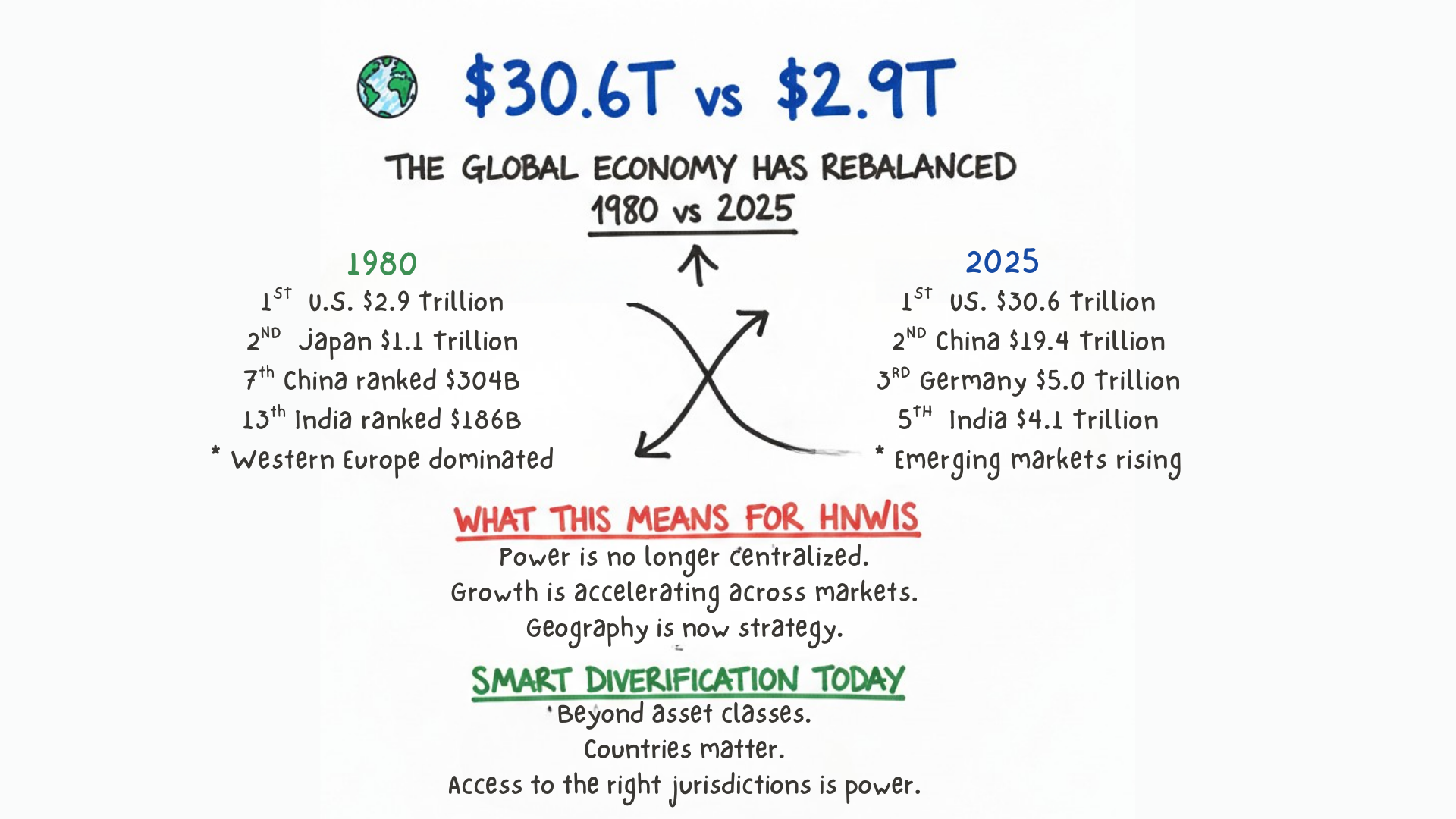Why Canada’s Passport Still Leads Over the U.S. in 2025

In 2025, Canada’s passport slipped two positions in global mobility rankings. While the drop may seem minor, it highlights an important trend, the ever-changing nature of international travel access.
Despite this slight decline, Canada’s passport continues to outrank that of the United States. It remains one of the world’s most trusted travel documents, offering visa-free or visa-on-arrival access to over 180 countries.
This isn’t just a win for Canadians it’s a clear message to global investors and internationally mobile families: passport strength is not permanent, and mobility must be actively protected, not assumed.
Passports are ranked based on the number of countries their holders can access without a prior visa. This includes visa-free, visa-on-arrival, and electronic travel authorizations (ETAs).
Canada’s two-place slip in 2025 is largely the result of minor shifts in visa access, not a reflection of declining international trust. These shifts could include:
- Changes in visa reciprocity with specific countries
- Updates to regional travel policies (e.g., EU Schengen visa rules)
- Global events that impact diplomatic relations
- Policy adjustments by foreign governments targeting all Western passports
Importantly, Canada did not lose any significant travel privileges it was simply outpaced by a few nations that made strategic gains in visa partnerships this year.
Even after the slip, Canada remains ahead of the U.S. in global mobility rankings. The U.S. passport has also lost ground, with visa-free access quietly shrinking over the past few years.
Factors contributing to the U.S. decline include:
- Lower reciprocity – the U.S. offers visa-free entry to fewer nationalities than it receives
- Strained diplomatic ties in key regions
- Recent exclusions from newly opened visa-free programs (such as China’s list in 2025)
- Tougher border and immigration policies that impact global perception
As of now, Canadian passport holders still enjoy broader access, particularly in Europe, Asia, and the Middle East and are generally seen as “neutral travelers,” a status that carries weight in today’s politically divided world.
The reality is this: passport rankings are not fixed. They can and do change every year based on global events, diplomatic negotiations, and domestic immigration policy.
This year, Canada slipped. Last year, the U.S. dropped out of the global top 10 for the first time in history. Next year, another country could rise or fall based on decisions made thousands of miles away.
That’s why mobility planning must be part of every high-net-worth individual’s long-term strategy.
What Happens If Your Passport Loses Access?
Let’s consider a few real-world scenarios:
- You plan to travel for business or family reasons but find new visa requirements in place
- A country you frequently visit suddenly suspends visa-free entry for your nationality
- A diplomatic crisis or political issue restricts access with little warning
- A health or security emergency forces quick relocation and not all passports get equal treatment at borders
Without a second passport or alternative residency, you could be left scrambling for solutions or worse, be stuck.
Plan B: Why Second Citizenship or Residency Matters
Many investors and international families are no longer waiting for mobility to be taken away they’re proactively securing backup options.
- Second Citizenship Benefits:
- Visa-free travel to 140–180+ countries
- Greater flexibility in emergency situations
- Expanded access to international banking and financial systems
- Family inclusion and generational mobility
- Tax efficiency in some jurisdictions
- Residency by Investment Benefits:
- Access to top-tier healthcare and education
- Option to live and work abroad without full citizenship
- Pathway to future citizenship in many countries (e.g., Portugal, Greece)
- Legal residence in politically stable, high-quality-of-life regions

Top Countries for Mobility Diversification in 2025
Now is the time to re-evaluate mobility and hiring strategies. Here are practical actions to consider:
- Caribbean Nations (St. Kitts, Antigua, Dominica, Grenada, Saint Lucia):
- Fast-track citizenship in 3–6 months
- Visa-free access to the EU, UK, and parts of Asia
- Investment starts at $100,000
- European Residency Programs (Portugal, Greece, Malta):
- Schengen Zone access
- Long-term pathway to citizenship
- Investment in real estate, funds, or business
- Middle East & Asia (UAE, Singapore, Malaysia):
- Excellent connectivity for global business
- High quality of life and political stability
- Attractive for entrepreneurs and HNWIs
How to Future-Proof Your Mobility
Here are steps to ensure you’re protected in a world of shifting travel policies:
- Review your current passport strength annually
- Assess your risk do you depend heavily on visa-free access to specific regions?
- Explore strategic programs that fit your lifestyle and investment goals
- Include your family in any planning many programs allow for full family inclusion
- Work with trusted advisors to ensure legal, tax, and immigration compliance
Contact us if you are interested in Citizenship by Investment
Our expert advisors will have a 1-on-1 consultation to find the best solutions for you and your family and guide you through the procedure.
Don’t Wait for a Door to Close
Canada’s passport may have slipped slightly in 2025 but it still stands strong. The U.S. passport, however, continues to weaken in influence and access.
The bigger message here is clear: passport power can change without notice. The only way to protect your freedom, flexibility, and future is to plan ahead.
Don’t wait until your passport loses access. Build your Plan B now.
Interested in a second passport or residency plan?
Speak with our expert advisors today to find out how we can help you secure long-term mobility, for you and your family.
Share this blog
Frequently Asked Questions
Related Articles
Beijing Is Watching Your Wealth; Turkey Offers a Legal Pathway
In an era of rising financial scrutiny, global investors are taking action. Discover why 89% of Chinese HNWIs are exploring…
CBI in Times of Uncertainty: When One Passport Is Not
Global uncertainty has changed the rules of wealth preservation. In today’s environment, one passport may not provide sufficient protection. This…
Nigeria Dangote Refinery Investment Opportunity for Strategic Investors
Nigeria’s Dangote Refinery investment opportunity reflects growing capital market maturity and infrastructure scale. For high net worth individuals and global…
13 CARICOM Nations Attract Over 1 Billion Dollars from 5
13 CARICOM nations attract over 1 billion dollars from 5 global powers, reinforcing regional credibility and investment stability. Sovereign commitments…
From Western Dominance to a Multipolar Economy (1980–2025)
From 1980 to 2025, global power shifted from Western dominance to a multipolar economy. Economic influence now spans several regions,…
Let’s Talk About Mexico: Structural Risk and Global Mobility
Mexico structural risk shows how quickly disruption can impact even major global economies. For HNWIs and business owners, global mobility…
Citizenship by Investment for Strategic Global Wealth Planning
Citizenship by Investment for Strategic Global Wealth Planning empowers high net worth individuals to diversify jurisdictional risk, enhance global mobility,…







